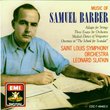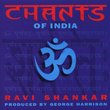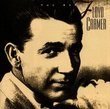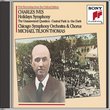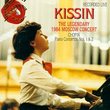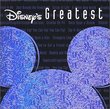| All Artists: William Appling Title: William Appling Plays Joplin and Bach Members Wishing: 0 Total Copies: 0 Label: Albany Records Original Release Date: 1/1/2010 Release Date: 1/1/2010 Genres: New Age, Classical Styles: Instrumental, Historical Periods, Classical (c.1770-1830) Number of Discs: 1 SwapaCD Credits: 1 UPC: 034061116325 |
Search - William Appling :: William Appling Plays Joplin and Bach
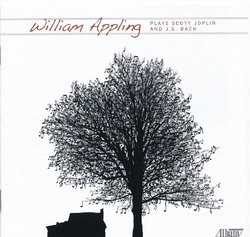 | William Appling William Appling Plays Joplin and Bach Genres: New Age, Classical
William Appling, who died in 2008, felt that the music of Joplin and Bach were perfect compliments to each other. He was passionate to have people hear that the two composers were comparable in the caliber of their work. B... more » |
Larger Image |
CD DetailsSynopsis
Product Description William Appling, who died in 2008, felt that the music of Joplin and Bach were perfect compliments to each other. He was passionate to have people hear that the two composers were comparable in the caliber of their work. Bach wrote tightly structured works within the baroque style and his music became more complex over time. Joplin worked the tightly structured rag style, developing and expanding it throughout his career. Both stylistically created music having melodies within melodies. These were two geniuses writing at the highest level and thus the idea for a recording pairing the music of both was born. Those people who heard William Appling play knew that his gifts as a pianist were equal to those as a conductor, teacher and mentor. This recording is a small sample of his genius. Similarly Requested CDs
|
CD Reviews'With All Deliberate Speed' J Scott Morrison | Middlebury VT, USA | 02/02/2010 (4 out of 5 stars) "This is a very strange but oddly attractive program of music. Who would ever have thought of combining the music of Bach with that of Scott Joplin? Well, apparently William Appling did. And he explained that both Joplin's rags and the two Bach pieces here -- the Italian Concerto and the First Keyboard Partita -- were composed in very strict forms with very clearly discernible inner voices. But perhaps the real impetus for Appling to play these two composers is that in 1996 he suffered a 'surgical mishap' that rendered him unable to operate the piano's sustaining pedal and thus he began focusing almost exclusively, for his own enjoyment, on the keyboard music of Bach which does not necessarily require pedaling. He then found in his collection the long-forgotten Joplin 'Complete Piano Rags'and discovered that the same technical approach could be used with Joplin's music, too. Thus on this disc, in addition to the two Bach works, there are: Elite Syncopations The Augustan Club Waltzes Magnetic Rag The Ragtime Dance Gladiolus Rag Euphonic Sounds, and Binks' Waltz Appling's playing is extremely clean and one can often hear 'air' between notes and phrases. Even if one didn't know about his injury one would quickly realize that he is not using the pedal. Additionally, his tempi are extremely deliberate -- read 'slow' -- and although this is at first a bit unsettling, one soon realizes that one is hearing EVERYTHING in a way that one might not at quicker tempi. It needs to be pointed out that the recent tradition for Joplin rags has been to play them fast in spite of the composer's very explicit instruction, repeated again and again in the scores, 'not too fast.' The more deliberate tempi restore what I have always felt was the proper feel for these works, one of dignity and lack of self-satirization. For that reason I really fell in love with Appling's interpretations. I realize there are those would prefer the Jo Ann Castle approach -- full-bore and hellbent for leather -- but I've always loathed her liberties and explicit disregard to the composer's intentions. You can make up your own mind about whether you'd like to experience Appling's more measured way with these treasures. The Joplin music here includes some of his best work. I've always loved 'Gladiolus', 'The Ragtime Dance' and 'Magnetic', and have played them myself with great enjoyment. I was both amused and pleased at the restraint, the gentleness, of the scored 'stomps' in 'The Ragtime Dance'; they are so decorous as to be almost inaudible and this, rather than a full-blooded stomp, fits with Appling's approach. (I think, actually, he is rapping quietly on the piano case rather than stomping.) The Bach is less memorable although it is certainly expert enough. Again, the main characteristic is the 'air' one can hear. Many players neglect the effect of silence in their playing, obviously something Appling did not. There is also some occasional subtle metric instability, not surprising when one realizes that absolutely no pedal is present to blur any irregularities. This CD will not be for everyone, but anyone intrigued by what I've written will not, I suspect, be disappointed. Postscript: William Appling (b. 1932) had a long and distinguished career primarily in the Cleveland area as a conductor, particularly of choral ensembles, as well as a pianist, educator and arranger. He died in 2008, not long after this recording was completed. Scott Morrison " A real find Michael Acheson | San Marcos, Texas | 03/04/2010 (5 out of 5 stars) "William Appling's recording of music by Scott Joplin and J.S. Bach is a revelation, particularly the performances of the Joplin compositions. Not using the sustain pedal places stringent demands on a pianist: there is simply no opportunity to "hide" and let the pedal do any of the work of connecting lines or melding phrases together. Pedaling is so often used as a crutch, but there is no chance for that here, and the performances shine as a result. Appling's playing of both Joplin and Bach is also extremely moving. I was not familiar with one the the Joplin works, "Binks' Waltz," and it almost brought me to tears the first time I heard it. Bach's Italian Concerto is beautifully controlled and utterly convincing. I had never thought of Joplin and Bach as complementing one another, but they really do. There is such remarkable clarity in the music of both composers, and absolutely no artifice. Much to my surprise, I found it not the least bit jarring to go from one to the other and back; on the contrary, it was extremely satisfying and refreshing. Finally, the recording itself is extraordinary. It has none of the faux concert hall sound of so many piano recordings. You feel as though you're simply there in the room, and it's wonderful. This CD was a real find."
|

 Track Listings (9) - Disc #1
Track Listings (9) - Disc #1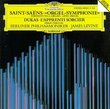

![Seussical [2000 Original Broadway Cast]](https://nationalbookswap.com/cd//m/02/4802/514802.jpg)
